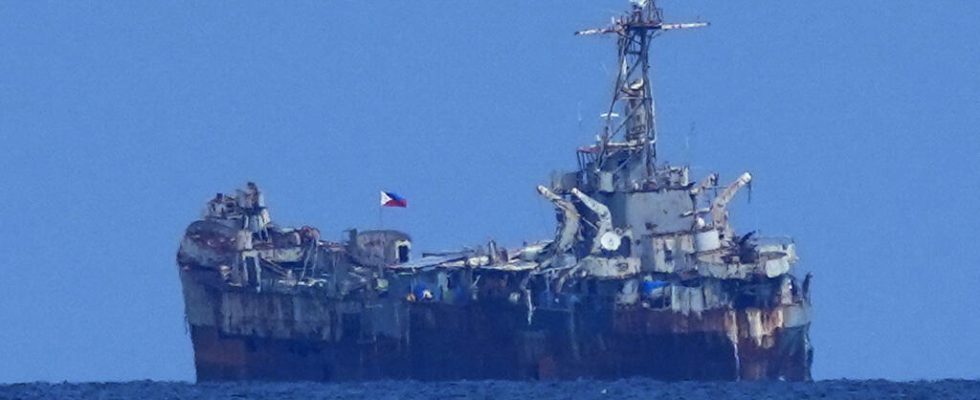This Sunday, December 10, a Philippine boat and a Chinese coast guard vessel collided in the waters of the Spratly Islands. The two countries blame each other for the incident a day after another confrontation in the disputed South China Sea.
4 mins
This Sunday, December 10, the Philippines affirmed that “ Chinese coast guard ships and Chinese maritime militia harassed, blocked Philippine civilian supply ships and performed dangerous maneuvers “. One of the two boats carrying supplies was “ hit » by a Chinese coast guard vessel, the National Task Force for the West Philippine Sea said in a statement. A Chinese ship also fired water cannons at two supply boats and a Philippine Coast Guard vessel that were escorting the mission, the Philippine statement added.
Deliberate collision
This caused “ serious damage » to the engine of one of the supply boats and damaged the mast of the coast guard vessel, this press release further clarified. China, for its part, accused a Philippine ship of being “ deliberately collided » with a Chinese coast guard vessel. On Sunday morning, four Philippine ships “ illegally entered ” in the waters of the Spratly Islands claimed by China, the Chinese coast guard said in a statement, adding that a Philippine vessel ” had not heeded our multiple and severe warnings “. The Philippine vessel “suddenly changed direction in an unprofessional and dangerous manner, deliberately colliding with our Coast Guard vessel 21556 which was on a normal law enforcement route and causing a scrape,” they also said. explained the Chinese coast guard in the press release. “ The responsibility lies entirely with the Philippine side “, they said.
This latest incident, which occurred near Second Thomas, an atoll in the Spratly Islands, took place the day after another confrontation between Chinese coast guards who “ hindered » using water cannons on three Philippine government boats that were supplying Filipino fishermen near the Scarborough Shoal, a Beijing-controlled reef off the Philippine island of Luzon.
Hours before Sunday’s incident, a civilian convoy of 100 Filipino fishermen set out on a journey that would take them through Second Thomas on a mission to supply remote outposts for Christmas. The organizers stated that they “ continued the agreed route » despite this last confrontation. Second Thomas Atoll is about 200 km from the Philippine island of Palawan and more than 1,000 km from the nearest big island and Chinese province, Hainan.
Numerous maritime disputes
A handful of Filipino soldiers are stationed on a military boat, the BRP Sierra Madre, stranded in 1999 on the atoll, serving as an outpost and allowing the Philippines’ claims to sovereignty to be asserted against China. These troops depend on supply missions for their survival. One of the boats intended for their supplies was able to deliver its cargo on Sunday, December 10, but the one involved in the collision had to be towed by a Philippine Coast Guard vessel to Palawan, the Unit said national operational.
Manila and Beijing have a long history of maritime disputes in the South China Sea through which billions of dollars of goods pass each year. Relations between Manila and Beijing have deteriorated under President Ferdinand Marcos, who has sought to move even closer to his traditional American ally and push back against Chinese actions in the South China Sea. Mr. Marcos warned last month that the situation in the waters had become “ more terrible “. A week ago, the Philippines reported that more than 135 Chinese ships were investing in the Whitsun Reef, which the Philippines calls Julian Felipe Reef, about 320 kilometers west of the island of Palawan, calling it ” alarming » their growing presence.
Beijing claims almost the entire South China Sea, including waters and islands near its neighbors’ coasts, and has ignored an international court’s ruling in 2016 rejecting the claim without legal basis. The Philippines, Brunei, Malaysia, Taiwan and Vietnam also claim several reefs and islets in this sea, some areas of which could contain rich oil reserves.
(With AFP)
Read alsoChina Sea: Manila wants to better monitor Beijing’s ships
